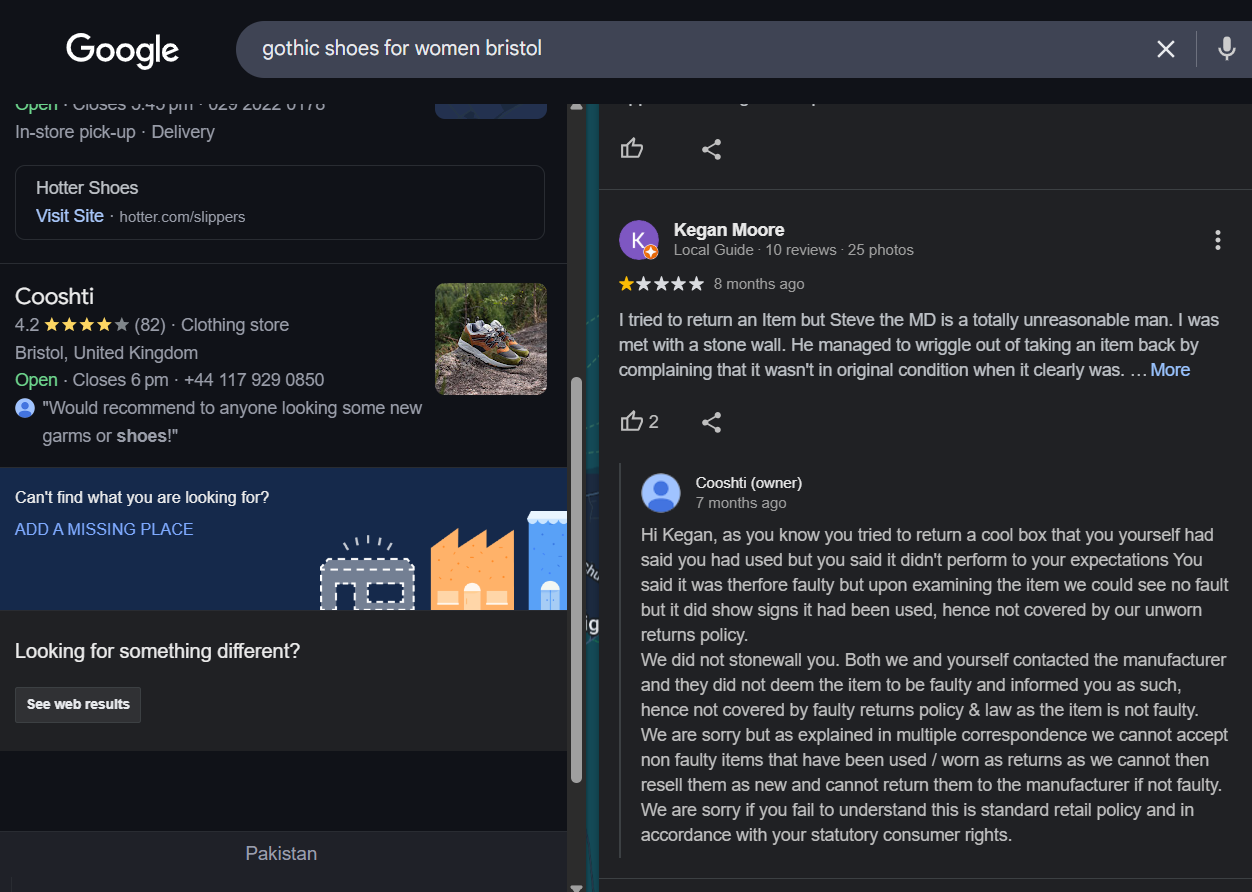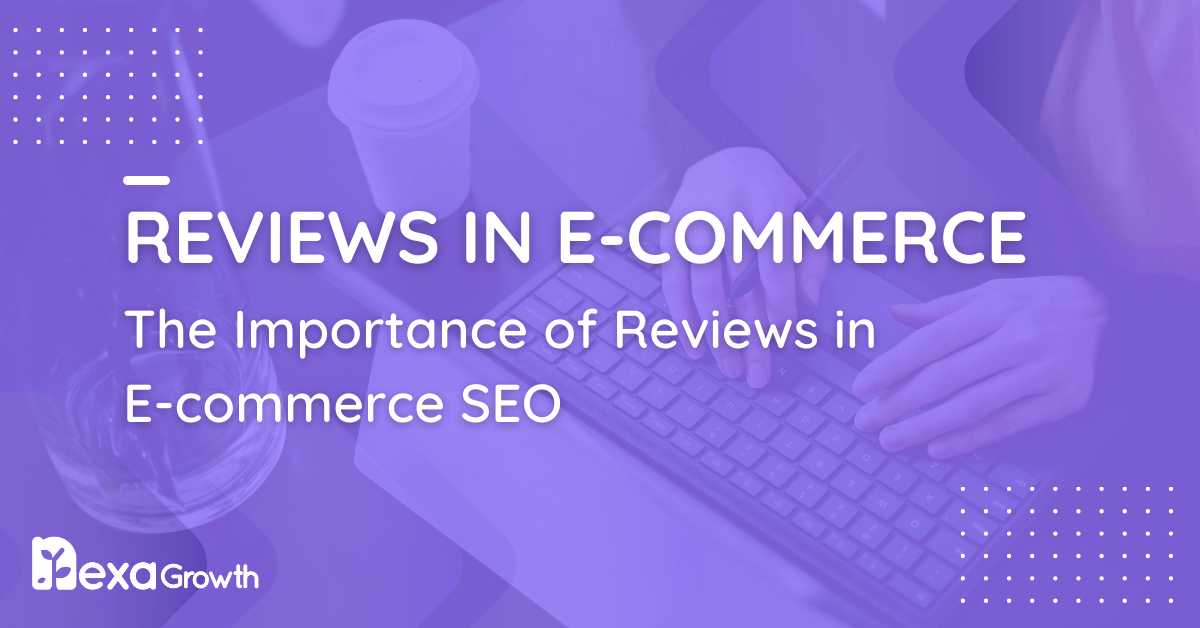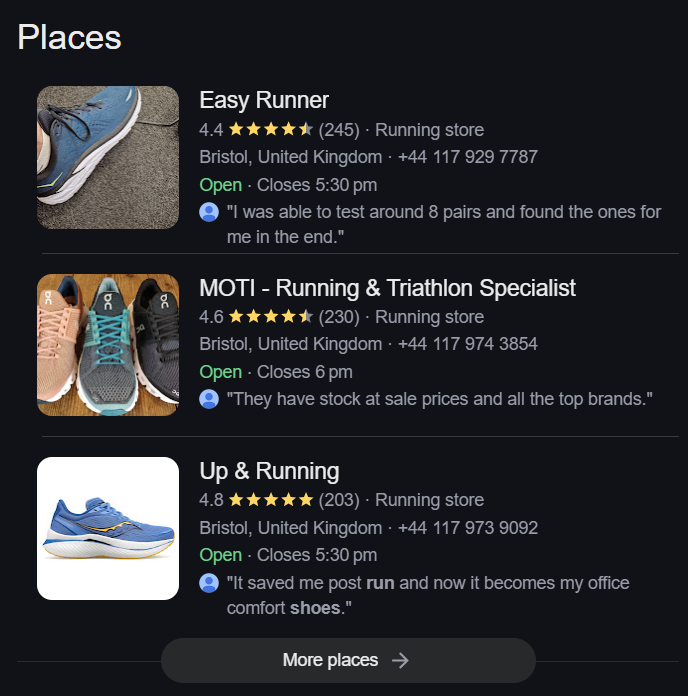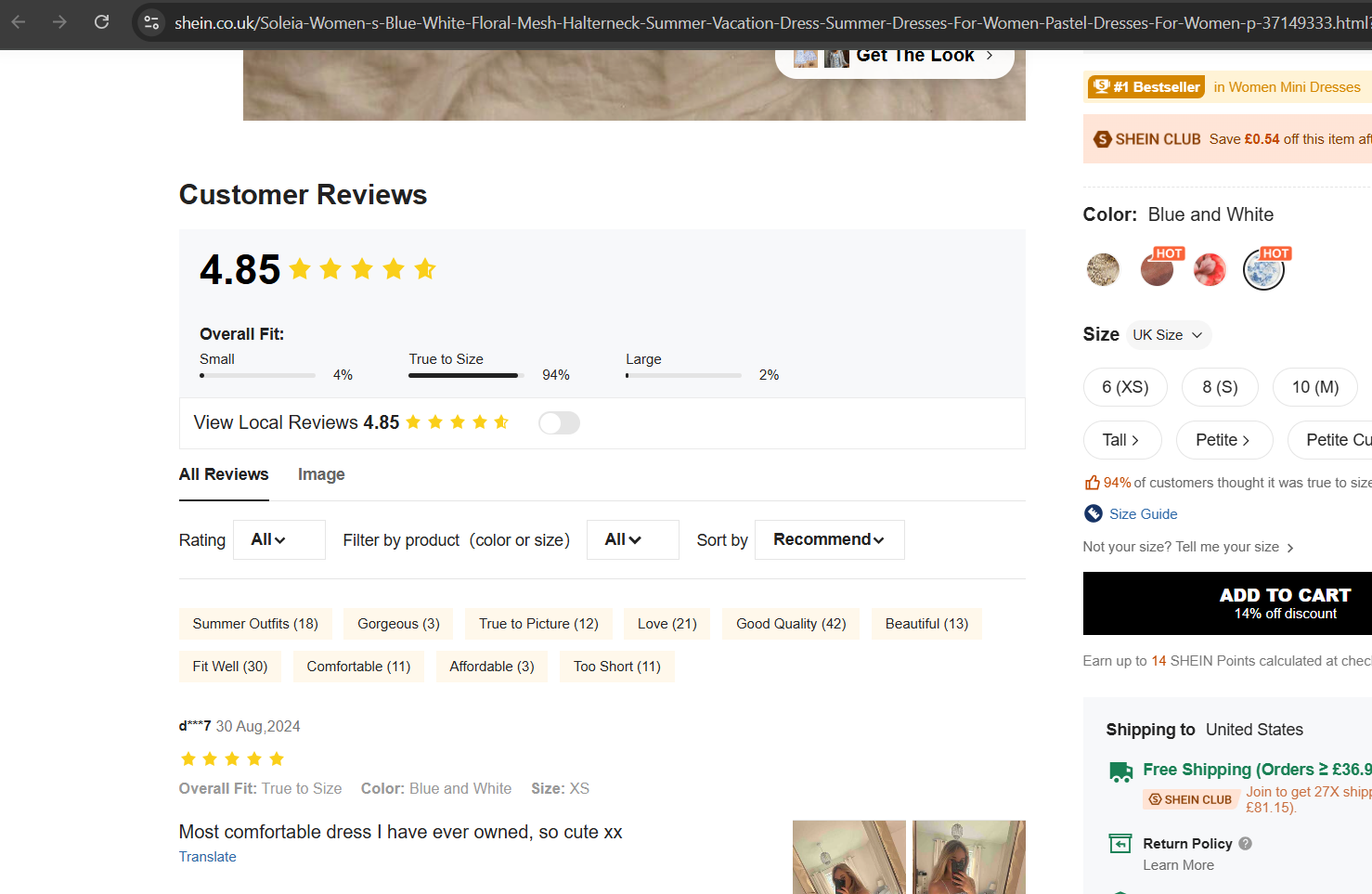- Customer reviews deliver fresh, user-generated content packed with natural, long-tail keywords—boosting SEO while keeping product pages dynamic.
- Review schema (e.g., review, aggregateRating markup) enables rich snippets—star ratings and feedback in SERPs, which raise visibility and click-through rates.
- Reviews enhance user engagement—extending dwell time, lowering bounce rates—and strengthen signals of trust and E-E-A-T (Experience, Expertise, Authority, Trustworthiness).
- Authentic reviews—even negative ones—foster credibility, inform shoppers realistically, reduce return rates, and reinforce brand loyalty when handled transparently.
The path to visibility and conversions runs through one increasingly powerful source: customer reviews. For e-commerce businesses, reviews have evolved from being a trust-building tool to a crucial SEO asset.
As search engines grow more sophisticated, they now place a higher value on user-generated content, engagement signals, and authenticity—all of which are directly influenced by product reviews.
According to a report by PowerReviews, 96% of customers read reviews when shopping online, and 96% specifically look for negative reviews to assess credibility.
Beyond influencing buyer behavior, reviews also have a measurable impact on search engine optimization.
Google’s algorithms reward fresh, relevant content, and reviews provide a continuous stream of it without the need for constant manual updates.
In fact, businesses that include reviews on their product pages see a 15–25% increase in organic traffic, according to Search Engine Journal.
The rise of zero-click searches and the growing importance of rich snippets have made structured review content even more vital.
Featuring stars, ratings, and user feedback in search engine results not only boosts click-through rates but also improves visibility in highly competitive categories.
In this article, we’ll explore the relationship between reviews and e-commerce SEO, the mechanisms behind their impact, and practical ways to maximize their value for both search rankings and conversion rates.
Your Products Deserve to Be Found
Let Nexa Growth turn your store into a search engine magnet—boosting visibility, traffic, and sales.
Contact UsWhy Reviews Matter in E-commerce SEO
Search engine optimization for e-commerce is no longer just about optimizing product descriptions or building backlinks.
As Google’s ranking algorithms evolve, so does the criteria for what makes a page valuable and authoritative.
One of the most consistently overlooked yet impactful elements in this equation is the presence of product reviews.
At their core, reviews are a form of user-generated content (UGC), which search engines value because it reflects real-world relevance and engagement.
Google interprets frequent and authentic user interactions—like reviews—as a sign that your site is alive, trusted, and useful.
This kind of content adds depth and context to product pages that might otherwise be thin, helping avoid issues with duplicate or low-value content.
Search engines also rely on signals of freshness, which refers to how recently and how often content is updated.
Reviews contribute organically to this freshness factor. Every new review adds updated, relevant language to your site, which keeps pages active in the eyes of search engines.
This is especially important in e-commerce, where hundreds or thousands of product pages can easily become static.
Additionally, reviews help bridge the gap between how you describe your product and how users actually talk about it.
This natural language—mainly when it includes specific phrases or problems solved—can help your site rank for long-tail keywords.
For example, a product page may begin ranking not just for “wireless earbuds,” but for user-written queries like “best wireless earbuds for running in the rain” if a review includes that phrase.
In short, reviews are not just feedback mechanisms—they are powerful SEO tools that help search engines understand the relevance, authority, and utility of your e-commerce site.
Featured Article: Internal Linking for SEO: The Complete Guide for 2026
7 Ways Reviews Improve E-commerce SEO
Reviews play a critical role in enhancing a website’s SEO performance across several dimensions.
They help improve content quality, keyword diversity, user engagement, and technical SEO elements like structured data.
Below are seven specific ways reviews contribute to stronger search visibility for e-commerce businesses.
Reviews Generate Fresh, Keyword-Rich Content Automatically
Search engines reward websites that frequently publish new and relevant content.
Reviews naturally fulfill this requirement by providing a steady stream of user-generated text that is both fresh and relevant to your products.
Unlike blog posts or landing page copy that need regular updating, reviews continue to grow over time without manual input.
As users describe their experiences in their own words, they often include keywords and phrases that reflect actual search behavior.
They Support Long-Tail Keyword Rankings
Long-tail keywords—search terms that are longer and more specific—often convert better because they reflect high-intent searches.
While product descriptions usually focus on broad terms, reviews cover real-life use cases, pain points, and benefits.
A review that mentions “lightweight running shoes for flat feet” helps that product page rank for a more targeted query than it might otherwise.
This long-tail content gives your site a wider range of keyword coverage and opens up ranking opportunities that would be difficult to capture through traditional SEO copywriting alone.
Enhanced Product Page Indexing With Review Markup (Schema)
Google uses structured data to better understand and display content in its search results.
When reviews are marked up using schema.org review or aggregateRating tags, search engines can extract star ratings and review counts directly.
This can lead to enhanced search listings through rich snippets, which stand out visually in the results and increase click-through rates.
Properly implemented schema also improves crawlability and indexing of individual product pages, making them more likely to be surfaced in relevant searches.
Boosted CTR Through Star Ratings in SERPs (Rich Snippets)
When reviews are surfaced as part of your search result listing—especially through star ratings—users are more likely to click.
According to a study by BrightLocal, 57% of consumers are more likely to click on a business with positive star ratings in Google search results.
These enhanced snippets draw the eye and help your listing stand out among competitors, even when you’re not in the top position.
The combination of visual appeal and social validation makes rich snippets one of the most powerful indirect ranking factors in modern SEO.

Product Reviews Appearing in SERPs Increased On-Page Dwell Time and Reduced Bounce Rates
When users land on a product page with genuine, detailed reviews, they tend to spend more time reading and engaging.
This extended dwell time sends positive behavioral signals to search engines, indicating that the content is relevant and satisfying user intent.
Conversely, low-engagement pages with little social proof may lead to quick exits, which can harm your rankings over time.
Reviews provide additional content for users to explore, increasing interaction and time on site—both of which are increasingly important ranking signals.
Positive Signals for Local SEO (Especially for Multi-location Stores)
For e-commerce brands with physical locations or local pickup options, reviews can improve local SEO performance.
Google’s local ranking algorithm places significant weight on review quantity, velocity, and sentiment.
Having a consistent stream of high-quality reviews across Google Business Profiles and product pages can help improve local visibility in map packs and localized search queries.
Even on e-commerce-only sites, reviews with local identifiers (e.g., “worked great for my apartment in Boston”) can support geotargeted relevance in search.
Contributes to E-E-A-T: Experience, Expertise, Authority, and Trustworthiness
Google uses the E-E-A-T framework (Experience, Expertise, Authority, and Trustworthiness) to evaluate content quality, especially for product-related searches.
Authentic user reviews directly contribute to the “experience” and “trust” components.
When real customers share detailed feedback about how a product works in actual use, it strengthens the overall perceived credibility of your brand and your pages.
Unlike purely promotional content, user reviews often reflect unbiased insights, which Google increasingly values when determining rankings.
Show Up Where Shoppers Are Searching
From product pages to collections, we optimize every inch of your store for maximum visibility.
Contact UsConversion Power: How Reviews Influence Buyer Behavior
While the SEO value of reviews is significant, their influence on consumer behavior is equally powerful.
Reviews serve as a form of social proof that helps reduce purchase hesitation, increase trust, and ultimately drive conversions.
In an e-commerce environment where users can’t physically experience a product before buying, customer feedback fills the gap.
Social Proof That Drives Clicks and Conversions
Social proof is one of the most effective psychological triggers in online shopping.
When potential buyers see that others have purchased and endorsed a product, they are more likely to follow through.
According to Spiegel Research Center, displaying reviews can increase conversion rates by as much as 270%, particularly for higher-priced products where risk is perceived to be higher.
Reviews function like word-of-mouth recommendations, only at scale. The more reviews a product has, the more legitimacy it gains in the eyes of consumers.
Builds Trust and Reduces Purchase Hesitation
Consumers are skeptical of marketing claims, but they trust the experiences of fellow shoppers.
In fact, 93% of users say online reviews influence their purchase decisions, according to Podium.
Transparent feedback—including reviews that discuss flaws or downsides—can actually strengthen credibility.
A product with only glowing, generic reviews can raise suspicion, whereas a product with a mix of thoughtful praise and constructive criticism appears more trustworthy.
This trust helps reduce cart abandonment and can accelerate the buyer journey.
Reduces Return Rates by Setting Expectations
Reviews help manage customer expectations by highlighting both the benefits and limitations of a product. This leads to more informed purchase decisions and, in turn, fewer returns.
If a reviewer mentions that a garment runs small or that a tech device has a steep learning curve, it prepares future buyers for what to expect.
By reducing return rates, businesses not only protect profit margins but also increase overall customer satisfaction and retention.
Enhances Brand Loyalty and Repeat Visits
Customers who leave reviews are often more invested in your brand. Encouraging reviews builds a sense of community and involvement, which can lead to stronger brand loyalty.
In many cases, users who engage with reviews—whether by reading or writing them—are more likely to return to the site, either to check back on feedback or to make additional purchases.
Over time, this behavior contributes to higher customer lifetime value and sustained business growth.
Featured Article: What Is Page Speed & How to Improve It
What About Negative Reviews?
Negative reviews are often viewed as a threat to both reputation and sales, but when managed correctly, they can actually strengthen your SEO and improve consumer trust.
A perfect five-star rating across every product might look ideal, but in reality, it can raise doubts about authenticity.
Consumers—and search engines—expect a mix of feedback that reflects real customer experiences.
Research from PowerReviews shows that 82% of shoppers specifically seek out negative reviews to help make informed decisions.
When users see a few well-articulated criticisms alongside mostly positive feedback, it signals transparency and trustworthiness.
This authenticity is something search engines value, especially under Google’s E-E-A-T framework, which includes trust as a key evaluation factor.
From an SEO perspective, negative reviews still count as fresh, user-generated content. They contain keywords, describe real-world product use, and increase engagement on product pages.
As long as the feedback is relevant and not spammy, it contributes to the overall content richness of a page.
How a business responds to negative reviews also matters.
Public responses that are respectful, solution-oriented, and timely show both customers and search engines that your brand values feedback and provides strong customer service.
This kind of engagement can mitigate damage, build trust, and even improve brand perception over time.
Rather than fearing negative feedback, businesses should view it as an opportunity: to learn, to improve, and to build credibility in the eyes of both customers and search engines.

Turn Your Online Store into an Organic Sales Engine
We optimize your site so that search engines love it—and buyers can’t ignore it.
Contact UsHow to Optimize Your Reviews for SEO
Collecting reviews is a strong first step, but to unlock their full SEO potential, they must be optimized and integrated strategically throughout your e-commerce site.
Proper implementation not only helps with rankings but also improves user experience and site performance.
Use Review Schema Markup
Schema markup allows search engines to better understand and display your reviews in search results. Implementing structured data—specifically, the Review, Rating, or AggregateRating schema—can enable rich snippets.
This displays star ratings, review counts, and other details directly in the SERP. These enhancements improve visibility and click-through rates.
Be sure the markup is valid and follows Google’s structured data guidelines. Avoid using fake or misleading markup, as this can lead to manual penalties.
Enable Reviews on Key Landing Pages
While product pages are the most obvious location for reviews, they shouldn’t be the only place.
Consider enabling reviews or testimonials on category pages, brand-specific landing pages, or even homepages if relevant.
This broadens the keyword footprint and helps improve rankings for non-product-specific terms.
If possible, use filters or tagging to show category-specific reviews, such as “best hiking gear” or “customer favorites in kitchen appliances.”

Customer Reviews on Shein’s Landing Page Encourage Keyword-Rich, Helpful Reviews
The more detailed and descriptive your reviews, the more SEO value they carry.
Encourage customers to go beyond star ratings and include specifics: what they used the product for, what features stood out, and how it compares to alternatives.
Prompting them with specific questions at the review submission stage can help generate more useful content.
For example, instead of “Rate this product,” try “How did you use this product, and what did you like or dislike about it?”
Integrate Reviews into Site Architecture
Don’t let reviews live only within isolated product pages. Create review hubs or user content sections that aggregate top-rated products, customer stories, or frequently mentioned features.
These pages can become valuable SEO assets, capturing searches like “best-rated portable chargers” or “customer-favorite skincare sets.”
Internal linking between these hubs and product pages also distributes link equity and improves crawlability.
Optimize Load Time and Mobile Experience
Search engines factor site speed and mobile usability into rankings. If reviews slow down your page—especially on mobile—they may hurt more than help.
Use lazy loading for large review blocks, ensure that your review widgets are optimized for performance, and avoid bloated third-party scripts when possible.
Also, make sure review content is fully visible and usable on mobile devices. Collapsible sections or “Read More” toggles can preserve layout without sacrificing content depth.
Real-World Examples: Brands That Boosted SEO With Reviews
Seeing how other e-commerce brands have successfully leveraged reviews can offer practical insight into what works.
Here are a few real-world examples of companies that improved their SEO performance and overall visibility through strategic review implementation.
Glossier: Building Keyword-Rich UGC at Scale
Glossier, the beauty brand known for its minimalist products, uses customer reviews not just for validation but as an SEO tool.
By encouraging detailed feedback, Glossier fills its product pages with natural language that mirrors how consumers search.
Many of its pages now rank for long-tail keywords such as “best moisturizer for sensitive skin” or “hydrating serum for dry climates,” much of it driven by customer phrasing in reviews.
In addition, Glossier features selected reviews prominently and includes them in on-site search filters, enhancing both UX and discoverability.
Wayfair: Leveraging Review Schema for Rich Snippets
Home goods giant Wayfair has effectively implemented structured data across its thousands of product pages.
The result is that a significant number of their listings display rich snippets—star ratings, review counts, and even customer Q&A—in Google’s search results.
This consistent use of schema markup contributes to higher CTRs and improved visibility, particularly for products with large volumes of feedback.
Wayfair’s technical execution ensures reviews contribute to both discoverability and user trust from the first search interaction.
Beanilla: Localized Review Content That Drives Rankings
Beanilla, a specialty vanilla and baking ingredients retailer, experienced measurable SEO gains after integrating product reviews on their site.
According to case studies, they saw a 20% increase in organic traffic and a boost in rankings for specific product-related keywords after enabling customer reviews with structured data.
Interestingly, many of the reviews included use cases tied to specific events or seasons—like baking for the holidays—which helped the brand capture seasonal long-tail searches without creating separate campaign pages.
REI: Community-Powered Product Pages
REI, the outdoor gear retailer, incorporates reviews alongside customer photos, Q&A sections, and product use cases.
This approach transforms each product page into a content-rich resource that performs well in both traditional and image-based search.
Reviews often include mentions of specific trails, climates, or activities (e.g., “used for a 3-day backpacking trip in Yosemite”), providing hyper-relevant contextual content.
By making reviews part of a broader content strategy, REI not only improves SEO but also enhances the customer experience and builds long-term loyalty.
Conclusion: Turning Customer Feedback into SEO Success
In the competitive world of e-commerce, reviews are more than just a tool for building trust with potential customers—they are a cornerstone of your SEO strategy.
By encouraging and optimizing reviews, you not only increase your site’s credibility but also improve its visibility and relevance in search results.
Whether it’s through rich snippets, long-tail keyword rankings, or the increased user engagement that reviews foster, the impact on your SEO is undeniable.
To maximize the value of reviews, businesses should focus on several key areas: implementing structured data for rich snippets, actively encouraging detailed and helpful reviews, and ensuring a seamless mobile and desktop user experience.
Managing negative reviews with transparency and responsiveness is equally important, as they can help strengthen trust and demonstrate your brand’s commitment to customer satisfaction.
The brands that truly excel at utilizing reviews—like Glossier, Wayfair, Beanilla, and REI—demonstrate how reviews can serve as a powerful growth engine, driving both organic traffic and conversions.
By following in their footsteps and integrating reviews into your SEO strategy, you can not only improve search rankings but also transform customer feedback into a critical asset for long-term success.
As you continue to build and refine your e-commerce presence, remember that reviews are not just a reflection of customer sentiment—they are a dynamic, ongoing part of your SEO and conversion strategy.
Build Authority. Rank Higher. Sell More.
We turn your E-commerce site into a search-friendly, sales-focused powerhouse.
Contact Us


